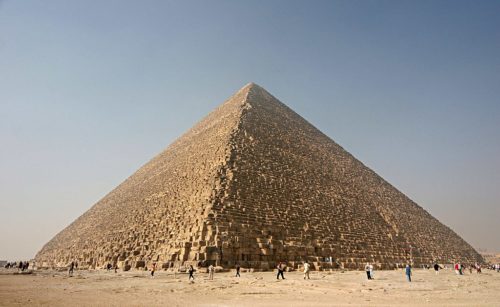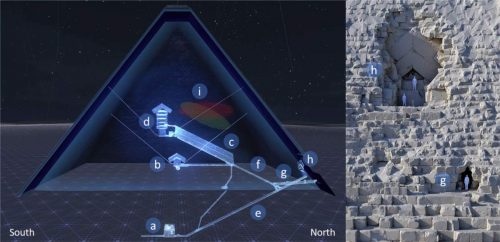Giza, Egypt —(Map)
Scientists have used clever methods to discover a hidden corridor (hallway) inside the Great Pyramid of Giza in Egypt. The 30-foot (9-meter) long corridor could lead to new discoveries about the pyramid.
The Great Pyramid of Giza is the largest of three pyramids near Giza, Egypt. It was built about 4,500 years ago by a king named Khufu. The pyramid was built as a place for Khufu to be buried.
The Great Pyramid is a massive building, made of over 2 million huge blocks of stone. Each stone block weighs over 4,000 pounds (1,800 kilograms). Until the Eiffel Tower was built in 1889, the pyramid was the tallest building in the world.

(Source: Nina [CC BY-SA 3.0], via Wikimedia Commons.)
The pyramid was sealed until 820, when the Muslim leader Caliph al-Ma’mun broke it open on one side. He found three rooms, one on top of the other, inside the pyramid. The largest room was the King’s Chamber. Below that was the Queen’s Chamber. There was another room underground.
The pyramid has a long, angled hallway, called the Grand Gallery. The Grand Gallery leads to the King’s Chamber. There are also other corridors that go up and down, and a tunnel that now serves as an entrance for tourists.
But most of the pyramid has been sealed since it was built. The pyramid is believed to hold many other secrets. But scientists don’t want to damage the pyramid by opening it up to learn those secrets.
Instead, since 2015, a group of scientists from around the world have been using invisible rays to scan the inside of the pyramid. They call their group “ScanPyramids”.

(Source: Procureur et al., 2023, via Nature.)
Though we never see them, the Earth is constantly showered with “cosmic rays” that come from the Sun or even outside our Solar System. As part of these rays, tiny particles called muons – smaller than atoms – are constantly striking the Earth.
Like X-rays, muons from cosmic rays can pass through solid objects. And, also like X-rays, muons from these rays can be used to develop of a rough picture of the inside of solid objects.
In 2017, ScanPyramids scientists discovered a secret empty space in the pyramid above the Grand Gallery. The space was large – about 98 feet (30 meters) long and about 30 feet (9 meters) high.
Now the ScanPyramids group has shown that there is also a hidden corridor not far from the tourist’s entrance to the pyramid.
😕
This image has not been loaded because of your cookie choices. To view the content, you can accept 'Non-necessary' cookies.
The scientists have shown that there’s a hidden corridor near the tourist entrance to the pyramid. One part of the corridor was close to the outside of the pyramid, allowing the scientists to look inside with a tiny camera. The pictures on the screen in the image above show the corridor.
The scientists thought they spotted the corridor in 2016. Now, with more research, they have learned exactly where it is and how big it is. The corridor is about 30 feet (9 meters) long and about 6.5 feet (2 meters) wide.
One part of the corridor was close to the outside of the pyramid. This allowed the scientists to use a special tiny camera to look inside, and actually see the corridor.
It’s still not clear what the corridor or the large empty space were for. The scientists believe they may have been used to help spread out the weight of the pyramid.
The researchers plan to continue scanning the pyramid – and others, too – in the hopes of learning more.
😕
This map has not been loaded because of your cookie choices. To view the content, you can accept 'Non-necessary' cookies.
